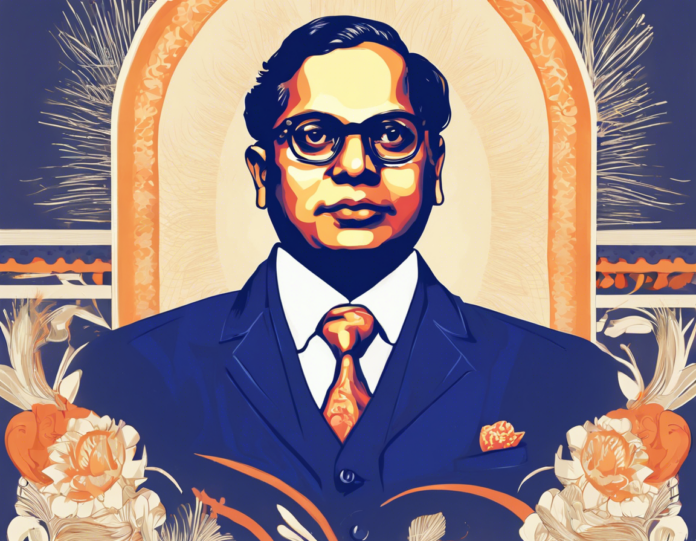Dr. Bhimrao Ramji Ambedkar, popularly known as Babasaheb Ambedkar, was a prominent Indian jurist, economist, and social reformer who campaigned against social discrimination towards the untouchables (Dalits) and also played a key role in the drafting of the Indian Constitution. His contributions to India’s social, political, and economic landscape are immense, and he is fondly remembered every year on 14th April, which is celebrated as Ambedkar Jayanti.
Early Life and Education:
Born on 14 April 1891 in Mhow, Madhya Pradesh, Dr. Ambedkar faced discrimination and social exclusion from a young age due to his Dalit background. Despite facing numerous challenges, he pursued education zealously and went on to become one of the most educated individuals in India during his time. He held multiple degrees from prestigious institutions both in India and abroad.
Fight Against Caste Discrimination:
Dr. Ambedkar dedicated his life to eradicating the caste system and fighting for the rights of the marginalized sections of society. He challenged the oppressive caste hierarchy and worked towards creating a more just and inclusive society. His efforts were instrumental in securing significant rights for Dalits and other oppressed communities.
Role in Indian Constitution:
As the Chairman of the Drafting Committee of the Indian Constitution, Dr. Ambedkar played a pivotal role in shaping the foundational document of independent India. He emphasized the importance of equality, justice, and liberty in the Constitution and advocated for safeguards for the disadvantaged groups. His vision laid the groundwork for a democratic and progressive India.
Legacy and Impact:
Dr. Ambedkar’s legacy continues to inspire generations of people fighting against discrimination and injustice. His teachings on social equality, individual rights, and empowerment resonate strongly in contemporary debates on social justice and affirmative action. The principles he espoused remain relevant in addressing present-day challenges related to caste discrimination and social inequality.
Celebrating Ambedkar Jayanti:
Ambedkar Jayanti is commemorated across India and in various parts of the world to honor the life and work of Dr. B.R. Ambedkar. On this day, various events, seminars, and cultural programs are organized to discuss his contributions and to reflect on the state of social justice in the country. Statues of Dr. Ambedkar are garlanded, and his famous speeches and writings are read out to inspire and educate people about his vision.
Achievements and Contributions:
- Social Reforms: Dr. Ambedkar led social reform movements advocating for the rights of the oppressed and marginalized communities.
- Legal Scholar: His expertise in law and constitution-making shaped the legal framework of India.
- Political Leader: He was an influential political figure who championed the cause of social justice through his involvement in politics.
- Educationalist: Dr. Ambedkar believed in the power of education to uplift society and established educational institutions for the benefit of Dalits.
- International Recognition: His tireless work for social reform and human rights has gained international acclaim, inspiring movements for equality worldwide.
Frequently Asked Questions (FAQs):
- What is the significance of Ambedkar Jayanti?
-
Ambedkar Jayanti commemorates the birth anniversary of Dr. B.R. Ambedkar and serves as a reminder of his immense contributions to social reform and nation-building.
-
How do people celebrate Ambedkar Jayanti?
-
People celebrate Ambedkar Jayanti by organizing events, seminars, and cultural programs, paying tribute to Dr. Ambedkar’s vision and teachings.
-
Why is Dr. Ambedkar known as the architect of the Indian Constitution?
-
Dr. Ambedkar played a key role in drafting the Indian Constitution and ensured that it reflected principles of equality, justice, and liberty for all citizens.
-
What were some of Dr. Ambedkar’s significant achievements?
-
Dr. Ambedkar was a trailblazer in the fight against caste discrimination, a legal luminary, a social reformer, and a champion of the rights of marginalized communities.
-
How did Dr. Ambedkar contribute to the upliftment of Dalits through education?
-
Dr. Ambedkar recognized the transformative power of education and established schools and colleges to provide quality education to Dalits and empower them.
-
What is the relevance of Dr. Ambedkar’s teachings in contemporary society?
-
Dr. Ambedkar’s teachings on equality, social justice, and empowerment remain relevant today and continue to inspire movements for equality and justice.
-
Why is Dr. Ambedkar’s legacy important for social reform movements in India?
-
Dr. Ambedkar’s legacy serves as a guiding light for social reform movements in India, inspiring people to fight against discrimination and work towards a more just and equitable society.
-
Did Dr. Ambedkar face challenges in his pursuit of education and social reform?
-
Yes, Dr. Ambedkar faced discrimination and barriers at various stages of his life, which fueled his determination to challenge social injustices and strive for equality.
-
How did Dr. Ambedkar’s vision influence the constitutional framework of India?
-
Dr. Ambedkar’s vision of social equality and justice influenced the inclusion of fundamental rights, safeguards for minorities, and affirmative action provisions in the Indian Constitution.
-
What is the global impact of Dr. Ambedkar’s work on human rights and social justice?
- Dr. Ambedkar’s work has had a global impact, inspiring movements for human rights, social justice, and equality in various parts of the world.
In conclusion, Dr. B.R. Ambedkar’s contributions to Indian society and his vision for a more equitable and just nation continue to resonate with people from all walks of life. As we observe Ambedkar Jayanti each year, it is an opportunity to reflect on his teachings, honor his legacy, and recommit ourselves to the ideals of equality, justice, and social inclusion that he tirelessly championed throughout his life.





